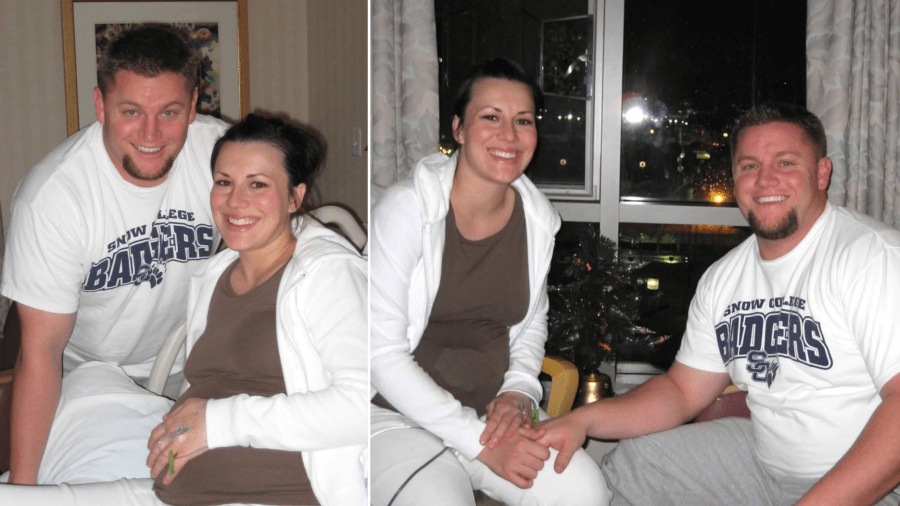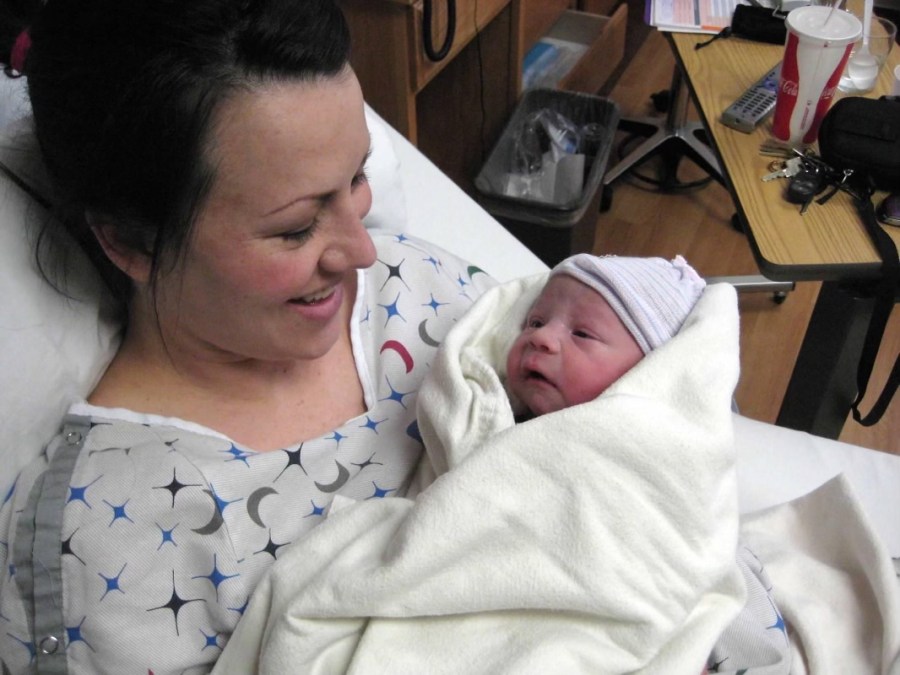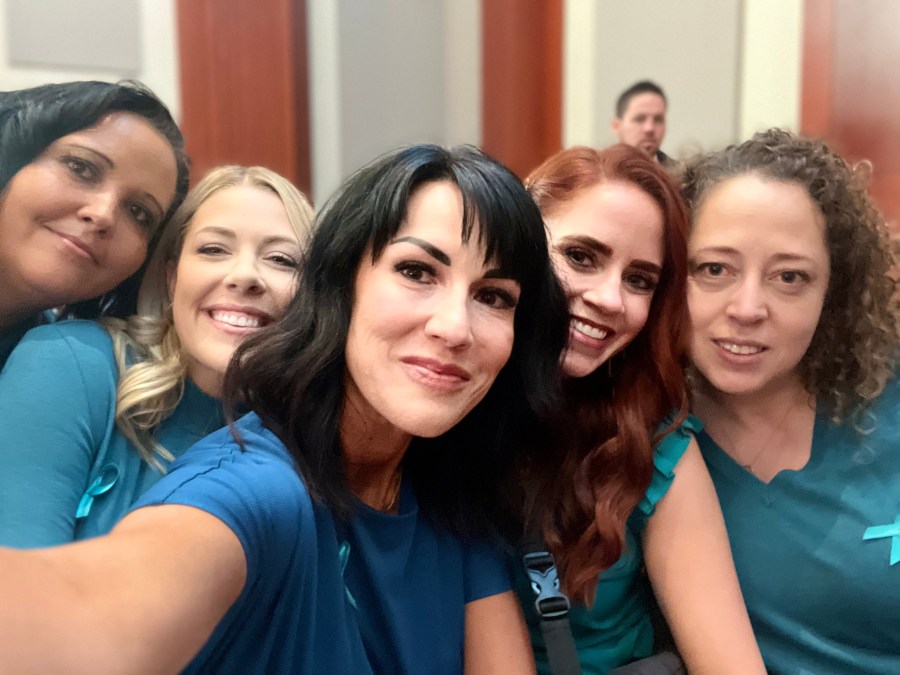Women await Utah Supreme Court opinion on OB-GYN assault claims
- 94 women accused a Utah OB-GYN of sexual assault
- Defense: Case should be filed as malpractice, claims are 'without merit'
- Attorney for Jane Does: ‘Sexual assault is sexual assault’

Jane Does wearing teal gather at the Utah Supreme Court. (Photo provided to NewsNation by Brooke)
Testing on staging11
Warning: This report talks about sexual abuse and assault. Anyone in need of services can contact the National Sexual Assault Hotline at 800-656-4673 or visit the Rape, Abuse and Incest National Network at www.rainn.org for additional resources.
(NewsNation) — Nearly 100 women accusing an OB-GYN of sexual assault are awaiting a decision by the Utah Supreme Court on whether to revive a lawsuit against the accused doctor previously dismissed by a judge in a lower court.
In a lawsuit, 94 women allege Dr. David Broadbent inappropriately touched their vaginas, rectums, and breasts — sometimes “in an abrupt or painful way” — without explanation or warning in some cases.
The case was dismissed last year, but the state supreme court heard arguments over whether to revive the lawsuit earlier this month.
Lawyers for Broadbent maintain the claims are “without merit.”
‘I realized I wasn’t alone’
Brooke, who is using only her first name to protect her privacy, says she was assaulted by Broadbent in 2008.
Brooke remembers feeling anxious before stepping into Utah Valley Hospital. An ambulance rushed her to the medical center in Provo while she was in premature labor with her first baby at about 33 weeks. She was assigned the on-call doctor, Broadbent.
A few hours after they arrived, Brooke says Broadbent told her he needed to perform an exam. In that time, she says he sexually assaulted her.
“I was very leery about whether or not I should say something,” Brooke told NewsNation. “My husband was actually in the room, and we talked it over and decided that if we did say something that maybe it could impede the care of our baby. Like if he came early, would that jeopardize his life? So, we decided not to say anything.”
Over the next few days, Brooke says she convinced herself that maybe she misunderstood what happened since it was her first child and she was unsure of what standard of care was considered normal.

“Then, every time he came into the room, I would just have incredible contractions because my body was just saying he shouldn’t be in here,” Brooke said.
She decided to confide in one of the nurses she felt comfortable with.
“Her eyes were massive. She asked if she could get one of the charge nurses or the nurse managers. I told the nurse manager what happened. She allowed me to get a new doctor for the duration of my time at the hospital,” Brooke said.
Brooke was eventually released from the hospital and ended up delivering her child full-term at a hospital in her own community.
“They just kind of brushed it aside,” Brooke said. “When they called to collect on the bill, I said, ‘I probably am not going to pay until you can tell me something’s been done about this because the nurse told me it would be escalated, and I haven’t heard anything.’ And they said, ‘Well he doesn’t work for us. He just has credentials, so you’re going to have to take it up with his office.’”
At that point, Brooke says she decided, “I’ve got a brand-new baby. I don’t have time or energy to fight this battle.”

Fourteen years later, Brooke came across an article about four women seeking to press charges against Broadbent.
“Suddenly, I realized I wasn’t alone and the concerns I had, that I brushed off, (…) were validated,” Brooke said.
She called the attorney’s office and offered to testify. She later joined the suit that was filed in February of last year.
Case Dismissed
In October 2022, Judge Robert C. Lunnen in the Fourth Judicial District Court of Utah granted Broadbent’s attorney’s motion to dismiss the civil case, siding with Broadbent’s attorneys who claimed the allegations were connected to medical malpractice action and were filed the wrong way.
Those accusing Broadbent argued it was a tactic to reduce the number of allegations that fall within the statute of limitations, claiming he’s been “allowed to prey on unsuspecting women due to his position as an obstetrician-gynecologist” for more than four decades.
“Many of us will have timed out and the statute of limitations will likely be over,” Brooke said. “It essentially cuts that 94 women into, I think, like eight that the statute of limitations is still open for during that time.”
The group appealed Lunnen’s decision to the Utah Supreme Court, arguing that alleged sexual abuse by a health care provider falling under Utah’s medical malpractice law is incorrect.
On Friday, Oct. 20, a sea of women dressed in teal for sexual assault awareness flooded the courtroom to hear the appeal.
Medical care or sexual assault?
Broadbent’s attorney Caroline Olsen argued that under Utah’s law, a medical malpractice action against a provider includes any action whether it is intentional or not.
“In some sense, it is true that health care, as any lay person would understand it, stops when medical malpractice starts,” Olsen said.
Judge Michele Christiansen Forster, a member of the Court of Appeals who was filling in on the Supreme Court, said that health care is defined as any act performed by any health care provider on behalf of the patient during medical care.
“There is no dispute these victims, these patients, were receiving medical care from Dr. Broadbent,” Forster said.
Terry Rooney — representing the 94 women — argued disgraced doctors Larry Nassar and Robert Hadden were practicing healthcare under that same logic.
“Sexual assault is sexual assault whether it happens in a hospital parking lot, whether it happens in a hospital or whether it happens in a clinic,” Rooney said. “It’s a different act. It’s an intentional act and the exact opposite of health care.”

Olsen said the question in the case is not whether the injuries arise from an act of health care, but whether they are connected to or originated from an act of health care.
“That is the case here regardless of whether you think that they have pleaded something that would amount to sexual abuse or not,” Olsen said.
Additionally, Olsen argued that Broadbent being an OB-GYN also differentiates the case.
“Any instance in which someone is in the office of a physician who is regularly going to need to be touching for example sexual organs, there’s going to be some kind of nexus that arises in a way that just doesn’t exist in other cases,” Olsen said.
Rooney countered medical providers should not be given a cloak of protection based on what kind of medicine they practice.
“That’s the concern that I have is that every health care provider who touches a private part is given more leeway,” Rooney said. “We think it should actually be the other way. If there is going to be a different standard, they’re the ones that need to be watched the closest because they have access to that.”
Following arguments on both sides, the justices will have to consider where medical treatment ends and abuse begins. Justice Paige Peterson explained the allegations paint a picture outside the normal standard of care for certain situations.
“When someone’s about to deliver (a child) and he says, ‘Oh, let’s do a breast exam right now.’ What? That’s not part of medical care. … There are allegations where there’s absolutely no need for something like that at that time and under the guise of it, he commits what would otherwise be sexual battery,” Petersen said.
What happens next?
The Utah Supreme Court is expected to issue an opinion on the appeal, though the timeline of when that opinion could be released has not been shared.
If they grant the appeal, it may kick the case back to civil court and through district court — meaning the case will get a fresh start.
If the appeal is not granted, Brooke said she and the other 93 plaintiffs will go back through malpractice channels.
“We’re not backing down. We’re ready to take it on for however long it needs to go,” Brooke told NewsNation.
In the meantime, Broadbent has reportedly lost his privileges at hospitals where he worked and is under investigation by police for more reports of assault.